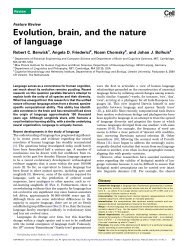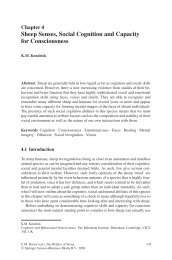Ulric Neisser
Ulric Neisser
Ulric Neisser
You also want an ePaper? Increase the reach of your titles
YUMPU automatically turns print PDFs into web optimized ePapers that Google loves.
of processing. This was already a rather obvious idea (cf. Broadbent, 1958), but no one had put it<br />
forward clearly and effectively. I could write a book!<br />
The sensible time to write that book would be on my upcoming sabbatical, which was<br />
scheduled to begin in the spring of 1965. But where? I was in luck: my friend Martin Orne was<br />
just then moving his grant-supported hypnosis laboratory, the "Unit for Experimental<br />
Psychiatry," from the Boston Psychopathic Hospital to the Institute of the Pennsylvania Hospital<br />
in Philadelphia. He offered to provide me with an office there for as long as I liked, an offer that<br />
I accepted happily. For financial support, I applied for and received a grant from the Carnegie<br />
Corporation.<br />
Meanwhile, my domestic life had unraveled completely.Anna and I were divorced in<br />
early 1964; I moved out of the house in Lincoln and into a two-room apartment in Somerville. I<br />
also began a relationship with Arden Seidler, who had three children of her own. These personal<br />
developments made me eager to leave the greater Boston area: it was time to start a new life.<br />
Arden and I were married - this time a real wedding - on New Year's Eve of 1964. A few weeks<br />
later we moved to Bala Cynwyd, a Philadelphia suburb. Arden's three children lived with us; my<br />
four children lived with Anna, who soon moved to the Upper West Side of Manhattan where I<br />
visited them often.<br />
In the upshot I stayed at the Unit for Experimental Psychiatry for 2 1/2 years; that's how<br />
long it took to write Cognitive Psychology. Martin Orne was helpful and generous in every<br />
possible way, as was Emily Carota Orne, his wife and collaborator who was then completing a<br />
Ph.D. in psychology at Brandeis. My stay at the Unit also gave me an opportunity to learn a bit<br />
about hypnosis, which turned out to be useful at several points in the book. I was also offered an<br />
adjunct position at the University of Pennsylvania, which provided a pleasant opportunity to<br />
teach a seminar in collaboration with my old friend and mentor Henry Gleitman. When the<br />
Carnegie grant ran out, I applied for and received an NIMH Fellowship. In short, the enterprise<br />
that became Cognitive Psychology (1967) was supported in every possible way.<br />
The primary goal of the enterprise was to bring together what was known about a wide<br />
range of phenomena: "The term 'cognition' refers to all the processes by which the sensory input<br />
is transformed, reduced, elaborated, stored recovered, and used" (p.4). After an introduction that<br />
made this goal explicit, ten chapters gave detailed and often technical accounts of the state of the<br />
art: five chapters on visual cognition, four on audition and language, one on memory and<br />
thought. At the theoretical level the argument relied heavily on the notion of "construction":<br />
perception was a constructive process, speech perception depended on analysis-by-synthesis,<br />
remembering was always constructive, etc. The general tone was positive: instead of attacking<br />
behaviorism I simply ignored its assumptions. "Cognitive processes surely exist, so it can hardly<br />
be unscientific to study them" (p.5). This upbeat attitude may have been one reason why the<br />
book became so popular.<br />
Cognitive Psychology legitimized and interconnected a wide range of research<br />
paradigms, bringing them together by giving them a name. Many psychologists found<br />
themselves in a position like that of Moliere's Monsieur Jourdain, who suddenly discovered that<br />
he had been speaking prose all his life! Most of them were pleased by the discovery, and<br />
"cognitive psychology" soon became an indispensable rubric. In the blink of an eye there were<br />
cognitive journals, courses on cognition, training programs in cognitive psychology, cognitive<br />
conferences of every kind. I myself was a star, now introduced everywhere as "the father of<br />
cognitive psychology." It was a heady experience for a young man not yet 40 years old, and its<br />
effect on me was to create something like an illusion of omnipotence. If I had changed<br />
9




